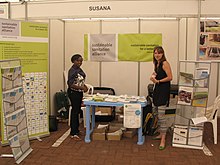




The Sustainable Sanitation Alliance (SuSanA) is a loose, dynamic network of organisations working along the same lines and with the same vision towards sustainable sanitation. Its formation in early 2007 was motivated by the UN's decision to declare 2008 as International Year of Sanitation (IYS). The goal was to have a joint label for the planned activities, and to be able to align with other potential initiatives.
SuSanA's vision document[1] contains a widely accepted definition of sustainable sanitation which was developed in a consultative process amongst many SuSanA partners.
SuSanA is not an organisation and it has no legal structure. It is open to others who want to join and be active in the promotion of sustainable sanitation systems. The Sustainable Sanitation Alliance invites other international, regional and local organisations to join the network, contribute ideas, and to become active members in the thematic working groups.
SuSanA's goal is to contribute to the achievement of the Millennium Development Goals (MDGs) and to the Sustainable Development Goals after 2015 by promoting sanitation systems which take into consideration all aspects of sustainability, i.e. health and hygiene, environmental and natural resources, technology and operation, finance and economics, socio-cultural and institutional.
SuSanA's mission was defined by its core group in consultation with members in 2014 as: "SuSanA is an open international alliance with members who are dedicated to understanding viable and sustainable sanitation solutions. It links on the ground experiences with an engaged community made up of practitioners, policy makers, researchers, and academics from different levels with the aim of promoting innovation and best practices in policy, programming and implementation"[2].
The activities of the SuSanA network have contributed to place sustainabilityfirmly on the map now in the sanitation sector. SuSanA members are actively helping to shape the post-2015 Sustainable Development Goals which may include a goal of universal use of sustainable sanitation services that protect public health and dignity. Otherplayers have picked up on the theme of innovative sanitation (with resource orientation), most notably the Bill and Melinda Gates Foundation. SuSanA meetings have moved from being a marginal group to mainstream, e.g. inclusion in AfricaSan in Kigali 2011, Africa Water Week in Cairo in 2012. Sustainable sanitation has become a topic in the nexus (water, energy, food) dialogue as well as in the WASH and nutrition theme.
The online discussion forum[3] of SuSanA which was launched in 2011 has brought together experts and novices worldwide and is helping to bridge the sectoral barriers between WASH and health for example. Since end of 2012, co-funding for the SuSanA discussion forum has been received by the Bill and Melinda Gates Foundation via a grant to SEI.
SuSanA has been criticised (and boycotted) by others in the WASH sector for a perceived dominance of the ecosan theme in SuSanA due to the fact that two of its founding organisations had a strong background in ecosan: Stockholm Environment Institute and Deutsche Gesellschaft für Internationale Zusammenarbeit (GIZ) GmbH. Others have criticised SuSanA for being too dominated by people from the Global North (who have the funding to attend SuSanA meetings), too dominated by GIZ who leads the secretariat and for being too "academic" and far removed from the realities on the ground.
SuSanA started in January 2007 with a kick-off meeting in Eschborn, Germany at Deutsche Gesellschaft für Internationale Zusammenarbeit (GIZ) GmbH who holds the secretariat since then. Initially the aim was to only prepare and align various organisations active in sustainable sanitation for the International Year of Sanitation in 2008.
Since 2007, SuSanA has held 18 meetings (the last one in September 2014). Each year one meeting takes place in connection with the World Water Week in Stockholm and a further meeting takes place in the Global South, usually connected to another WASH (Water, Sanitation, Hygiene) event. SuSanA also organises side events, seminars and working group meetings in conjunction with other major conferences.
SuSanA has twelve thematic working groups covering all the main areas of sustainable sanitation where conceptual and knowledge management work is required[2]:
SuSanA has 231 partner organisations (as of June 2014)[2] of the following types: Local NGO, International NGO, private sector, research and education, Governmental / State-owned organisation, multi-lateral organisations, associations and networks and others. Individuals can join as members and there are currently over 4100 members[4].
In order to get involved, members can register their organisation as a SuSanA partner organisation, attend SuSanA meetings or side events, volunteer their time as lead or co-lead for one of the SuSanA working groups, apply to become part of the core group to facilitate coordination and take certain decisions between SuSanA meetings and spend one hour per week sharing their work via the various SuSanA tools.
{{cite web}}: Check |url= value (help); Check date values in: |accessdate= (help)
{{cite web}}: Check date values in: |accessdate= (help)